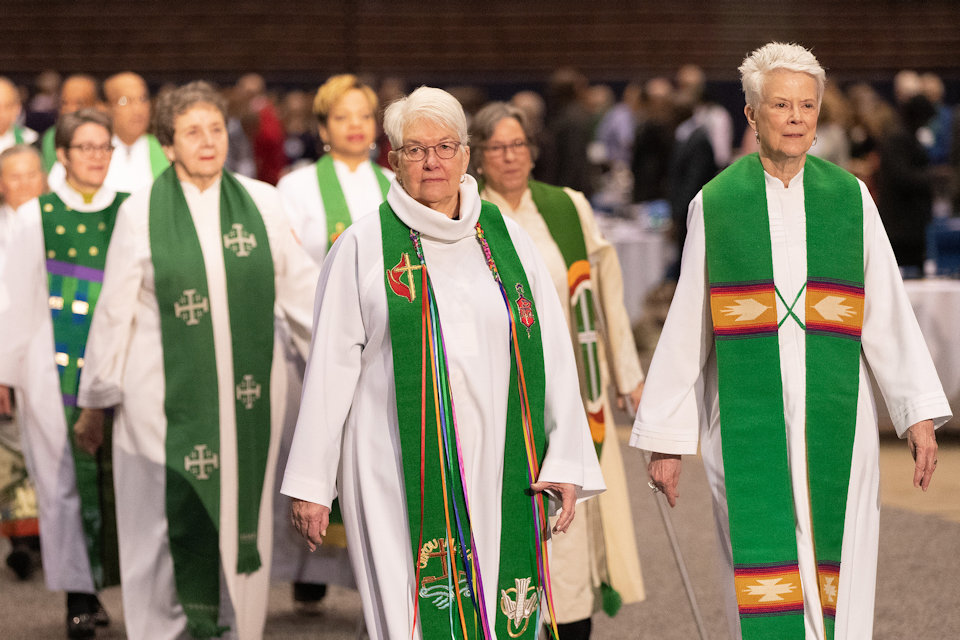Four of the 34 women bishops of the United Methodist Church came from Michigan. They are remembered in this summary of a book celebrating their extraordinary Gifts of the Spirit.
REV. MOLLY TURNER
Retired clergy, Michigan Conference
Women Bishops of the United Methodist Church: Extraordinary Gifts of the Spirit, by the Rev. Dr. Margaret Ann Crain and Bishop Sharon Zimmerman Rader; Abingdon Press, 2019.
In 2017, over a summer lunch near Lake Michigan, Bishop Sharon Zimmerman Rader and the Rev. Dr. Margaret Ann Crain began dreaming of recording the stories of the first women elected as bishops of a major denomination. As they chatted over lunch with their husbands, Sharon mentioned her interest in the stories of these women who were serving in The United Methodist Church. Two bishops, Bishop Marjorie Matthews and Bishop Leontine Kelly had already died. Sharon said, “We need to collect these stories before they are gone.” Margaret Ann responded, “One of my scholarly interests is narrative research, and I love to do interviews. Maybe I could help you.” (p. 1)
The book published in 2019, is rich with the history of lay and clergywomen dreaming, planning and working together with church agencies to prepare for the day when the Council of Bishops would be inclusive of extraordinary women of all ethnic backgrounds. The book shares the stories and reflections of all 34 women who have been elected bishop in The United Methodist Church from 1980 through 2016.
The leadership style and perspectives of each woman bishop are unique. However, in telling her story, each woman spoke of her reliance on the Holy Spirit to discern if she would offer herself to be a bishop if elected. Equally, each expressed her reliance on the Holy Spirit to lead the Church from her soul.
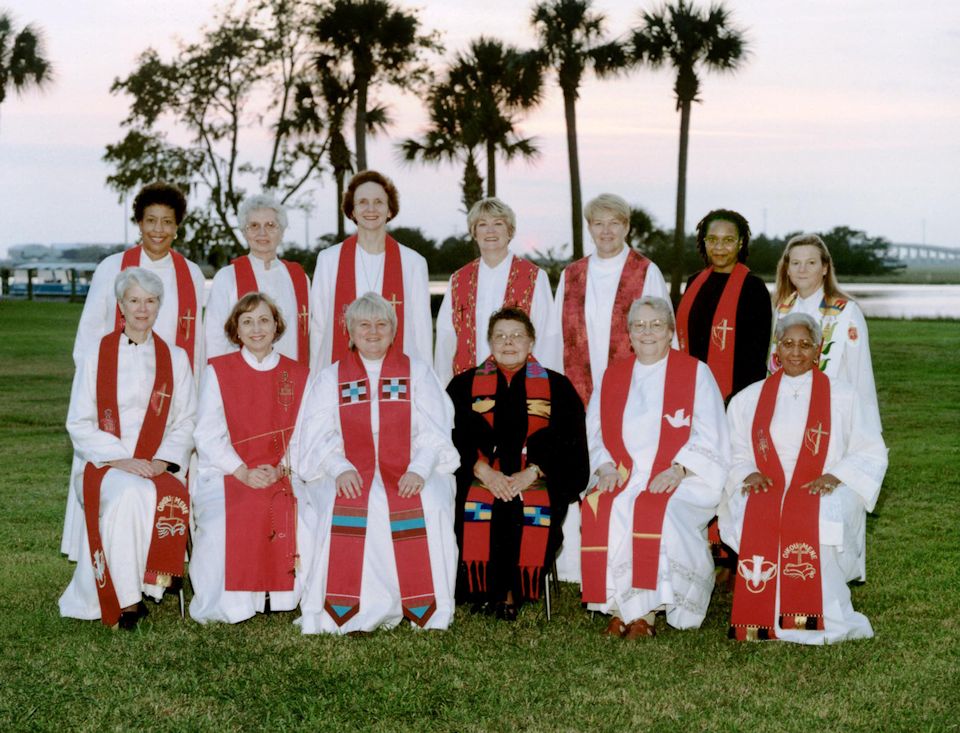
Michigan Stories
During these years between 1980 and 2016, The Michigan Area, i.e., the former Detroit and West Michigan conferences, had the privilege of being served by Bishop Judith Craig, 1984-1992; Bishop Linda Lee, 2000-2004; and Bishop Deborah Kiesey, 2012-2016.
This article, however, tells the stories of the four women from Michigan who were elected to be bishop. These are stories of Michigan women offering up their spiritual gifts and teams of lay and clergy leaders who assisted them in their election.
The former West Michigan Conference has a unique record. No other conference in Methodism has endorsed seven women, and no other conference has had four women they endorsed be elected since 1980.
These four extraordinary women are Bishop Marjorie Swank Matthews, Bishop Sharon Zimmerman Rader, Bishop Linda Lee, and Bishop Laurie Haller.
When asked to write this article, I sought the help of four of my retired clergy sisters, who I knew were part of support teams for the four Bishops Matthews, Rader, Lee and Haller. Many thanks to the Rev. Ellen Brubaker, the Rev. Lynn Pier Fitzgerald, the Rev. Deb Johnson, and the Rev. Susan Hagans for their stories shared.
Bishop Marjorie Swank Matthews
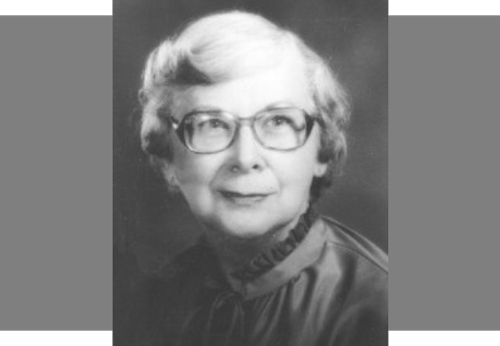
The first woman bishop elected in The United Methodist Church, Bishop Marjorie Swank Matthews, was endorsed by the West Michigan Conference and elected at the 1980 North Central Jurisdictional Conference. Dr. Marjorie Matthews “was the first woman in the United Methodist Church, the first woman in Anglican or Protestant traditions and, perhaps, the ‘first in Christendom since at least the twelfth century’ according to NEWSCOPE, the weekly United Methodist newspaper. ( p. 19)
Sharon Rader, who was present as a reserve Jurisdictional delegate tells the moving story in the book about what happened that day.
Others were in the background, assisting in so many ways. Here are their remembrances of this historic moment in time.
Rev. Ellen Brubaker remembers:
I believe it was at a clergywomen’s meeting before 1980 when a topic of discussion was the need soon for a woman in the episcopacy. As was discussed in the prologue to the book, several well-known women had been mentioned as episcopal candidates for 1980. None of those women were ready to become episcopal candidates at that time.
I remember walking with Marge, who said very quietly, “Perhaps someone not as well known could make herself available and see what would happen.” Further discussion helped me to understand that Marjorie would be willing to be that candidate. In speaking to other women at the meeting, there was affirmation for her candidacy. I always felt that she offered this for the sake of the Church and women in ministry and not for personal ambition. Soon after the committee was formed around her candidacy, we worked very hard to help Marjorie to be better known, along with her vision for the Church.
Rev. Lynn Pier Fitzgerald writes:
Deb Johnson and I attended the Clergywomen’s Consultation held in Dallas, Texas. One evening, attendees were invited to Jurisdictional meetings allowing the women present to reflect on agendas for the upcoming jurisdictional conferences. At the North Central Conference, the names of women were lifted as possible bishop candidates. Some of the named women were present and quickly declined. But Marge Matthews, who was lifted, was not in attendance. After the meeting, several women leaders stayed behind and seriously engaged the question: was Marge Matthews, a person who might be lifted? After a vigorous discussion, the women came together with a yes. If Marge was willing, they would support her as a candidate for bishop. I felt like I had witnessed something historic. A whole new world was opening up; the possibility of Christianity’s first woman Bishop.
Rev. Deb Johnson recently reflected on this moment in history:
Last year at Annual Conference, one of my colleagues asked, “When did elections to general and jurisdictional conference become so political?” I laughed and said, “I remember when it was important that Marjorie Matthews be elected first so she would head our delegation and have some credibility as a potential episcopal candidate.” That election happened the year I was ordained a deacon (and couldn’t yet vote for delegates). I was a seminary student that year (1980) at General Conference. I watched as Marge got elected to lead a legislative committee and all the political work that went into that two weeks, the coalitions with other women in the jurisdiction, the critique of Marge’s leadership that wasn’t ‘male’ enough.
Through all of the work of getting Marge elected, she was always just “our Marjorie,” the wonderful, wise, sweet, and strong leader who I was proud to have as my District Superintendent. I couldn’t be at Jurisdictional Conference because I was doing C.P.E. that summer, but I awaited the call about the election that we all had worked for, hoped for, and sometimes feared. As I wrote in my journal that day, “A hundred years – sweet Anna Howard Shaw – a hundred years since your ordination and now your daughter Marjorie is a bishop. A dream fulfilled last night at 5:30 in Dayton, Ohio, on the 29th ballot by acclamation. We had so conditioned ourselves to feel OK about the loss that the win was overwhelming. As the sun rises, sweet Mother God, your daughter rises to meet it as the first woman bishop.”
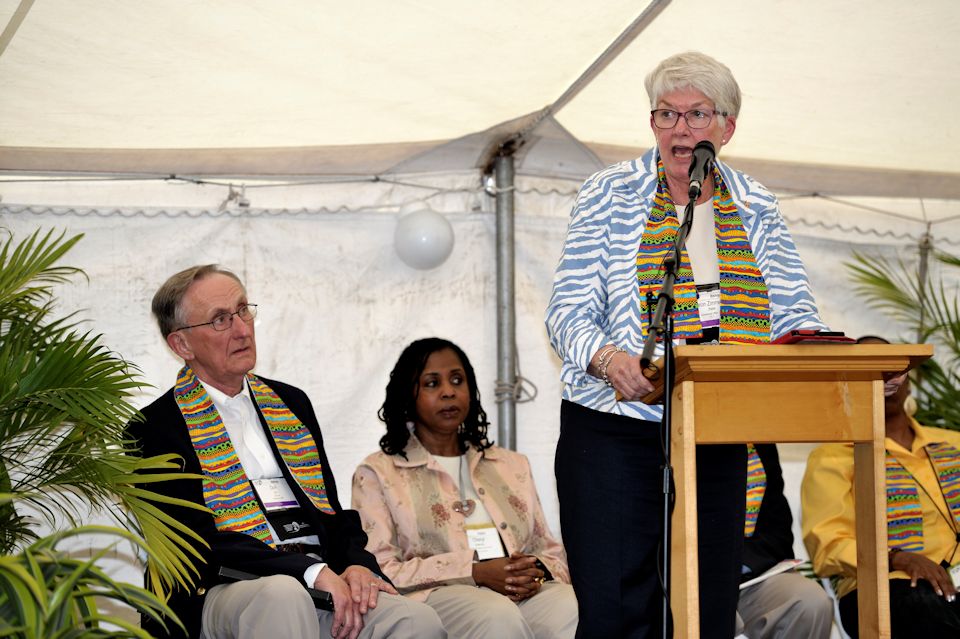
Bishop Sharon Zimmerman Rader
Bishop Sharon Rader is, for many lay and clergywomen, a real mentor and friend. I found her gentle guidance extremely helpful when I served with her as a district superintendent on the cabinet and later when I was the Michigan Area Clergy Assistant to the Bishop. This trait of mentoring has always been present in her extraordinary gifts as a church pastor, administrative leader, and friend.
Rev. Ellen Brubaker writes:
Being good friends with Sharon through the years, we have discussed many things: family, Church, the world around us. In one such discussion, we were talking about possible future Doctor of Ministry studies. I remember Sharon saying that she would like to study more about the ministry of administration. I came to know through such discussions the gift that she would become to the episcopacy. This is a ministry filled with administrative responsibility, which Sharon would approach spiritually and with wisdom.
Rev. Lynn Pier Fitzgerald writes of Sharon’s journey to election:
I was the beneficiary of the support and invitation to leadership by women in the West Michigan Conference- both lay and clergy. When Sharon Rader offered herself as a candidate for bishop in 1988, I was invited to be on the team of persons guiding her process and supporting her. It was something of a painful journey when she withdrew as a candidate at the Jurisdictional Conference at Dekalb, Illinois. There were some hard lessons in the amount of resistance to women’s leadership in the weeks leading up to the conference and during the conference itself. Yet, it was also powerful to observe the grace and grit that Sharon brought to the process. And she testifies to that in her reflections about that conference in the book. (p. 46)
In early 1992, Sharon asked if I would lead the team of supporters as she offered herself again as a candidate for bishop. There were many others she could have asked, but this was consistent with her commitment to mentoring and advocating for women in leadership. As she says in the book, her “holy indifference” held steady through the entire process. As she reported: “Whatever happens will be the will of the Church. And the Church, as Christ’s body, will be okay. I was calm through the whole process. I did not hide what I cared about or who I was. I was a feminist, a supporter of full inclusion for members of the LGTB community, and a worker for justice.” (p. 48)
Bishop Sharon Zimmerman Rader was elected at the 1992 Jurisdictional Conference at Adrian College. Adrian was a familiar place for Sharon. Her journey toward ministry had been nurtured there. Adrian First United Methodist Church had recommended her as a candidate for ministry. Her husband was a professor there in his early ministry. Sharon had taught school in the community, and her two children were born while the family was there. (p. 48)
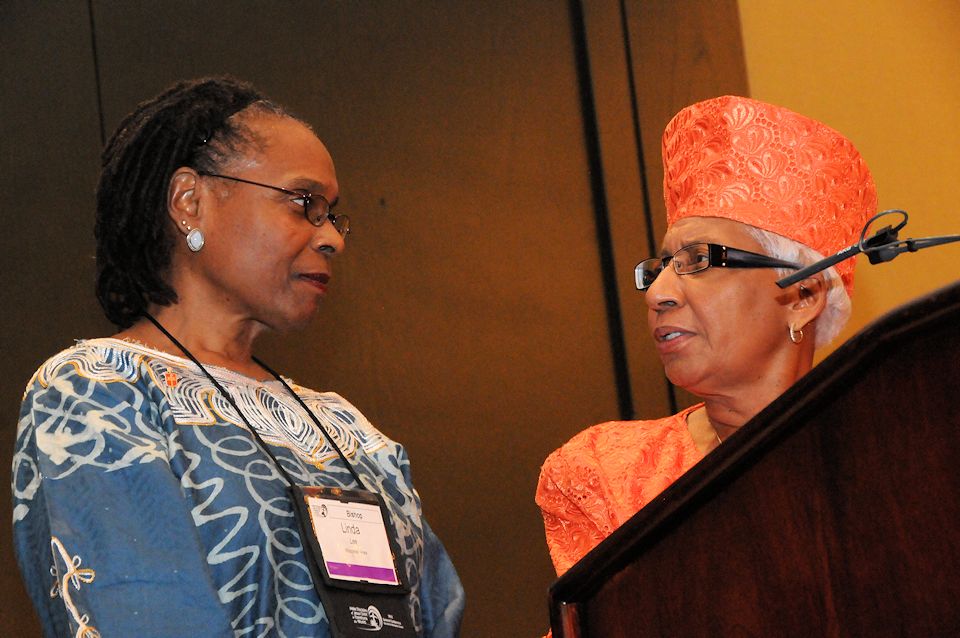
Bishop Linda Lee
Bishop Linda Lee was elected to the episcopacy at the 2000 Jurisdictional Conference. She was one of three African American Women across the United States elected as bishop that year. Bishop Leontine Kelly had been elected in 1984, and it was 16 years later in 2000 when the next three African American clergywomen would be elected: Bishop Linda Lee, Bishop Beverly J. Shamana, and Bishop Violet Fisher.
Rev. Ellen Brubaker remembers:
I recall being excited that the then West Michigan Conference announced its desire to endorse episcopal candidates of racial and gender variety. Linda Lee, coming from our sister Detroit Conference, was such an endorsement on our behalf. Linda became our bishop and emphasized for us the ongoing need for sabbath time. She encouraged us to take time for prayer and spiritual renewal amid busy clergy and lay leadership.
Rev. Lynn Pier Fitzgerald added:
I was part of the support team for Linda Lee when she was elected in 2000. One of the delightful learnings for me from the Crain/Rader book was the discovery that there had been prophetic wisdom from African American clergywomen about the election of three African American clergywomen to the United Methodist episcopacy in the year 2000. (p. 59) I recall a late-night conversation with delegates jammed into a hotel room and witnessing to my experience of Linda Lee as a leader with deep spiritual wisdom and wide compassion. However, in her quiet presentation, those aspects of leadership weren’t always visible.
Hearing God’s call through individuals and the Church, a process of discernment is a theme running through the stories of these women, who have been elected as bishop. Even when there is reluctance or self-questioning, there is deep power in the sense that the community of the Church is calling and even claiming the gifts which are needed. Linda Lee says it this way: “And there was no doubt that- through all these people over the decades and at the jurisdictional conference — it was God’s doing.” (p. 67)
I had the privilege of serving as Clergy Assistant to the Bishop from 2000 -2003 while Bishop Linda Lee served the Michigan Area as bishop. She had returned to her own conference and area to become Michigan’s bishop. She is a profoundly spiritual leader focusing on helping clergy to recognize their ongoing need for Sabbath, renewal, and prayer. She helped many clergy and laity in the Michigan Area become closer to God, and more spiritually able leaders in our congregations. God’s presence was felt in new ways here and in Wisconsin, where she served as bishop from 2004-2012. Through Bishop Lee’s powerful preaching, her teaching, and her own Spirit-filled life, many lives are changed.
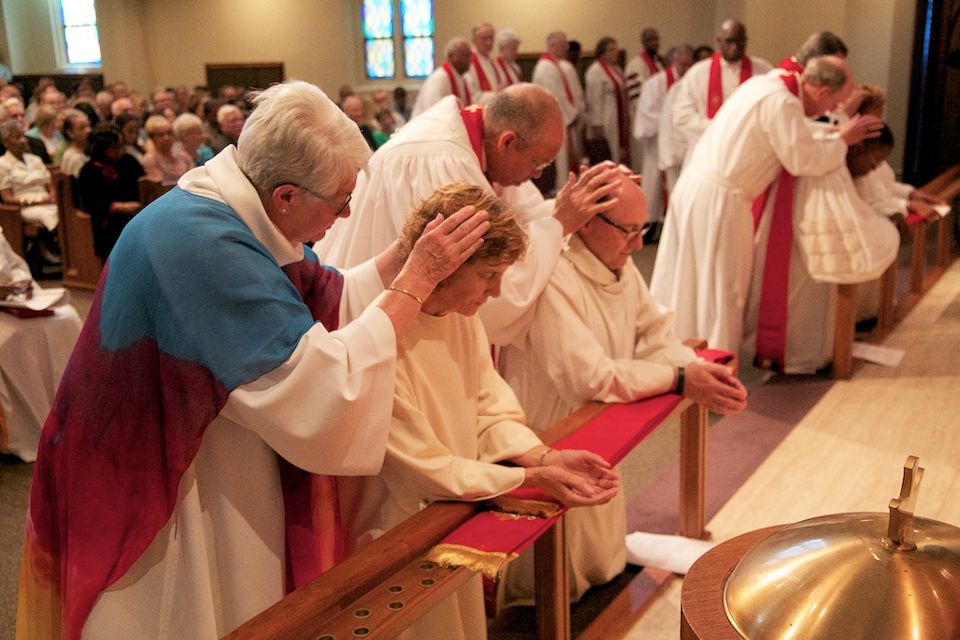
Bishop Laurie Haller
Bishop Laurie Haller was elected to the Episcopacy in 2016. She is currently serving in the Iowa Conference.
Rev. Susan Hagans writes of Bishop Laurie Haller:
Laurie Haller was given all kinds of advice, mostly unsolicited, once her name began being raised as a possible candidate for becoming a bishop in The United Methodist Church. “Get a good photo taken.” “Be sure to smile.” This former Mennonite woman, who had never worn makeup or fancy clothes (nor cared to do so), was even in the process advised to “look more like a Bishop if she wanted to be elected!” I was present in a group where Laurie was also cautioned to “be careful about coming out so forcefully with her deeply held convictions embracing full inclusion of all God’s people, including LGBTQ+ people.” That’s too controversial, they said—so much advice. Be cautious. Get prettier. Play the game. Don’t rock the boat.
Laurie listened and smiled but followed her own path instead. Laurie Haller simply showed up as who she was: principled and grace-filled, a visionary, a singer of hope, a woman of deep faith and love for Christ, and the people she served. She showed up, with her scrubbed face, her bright blue eyes, her clear mind, and her good heart.
So, no surprise, it wasn’t exactly an easy election, that 2016 Jurisdictional Conference. Laurie had been very honest and forthright in her interviews, and she was too controversial for some. One conference even decided to bring a brand-new nominee in at the last moment, rather than vote for Laurie, who by that time was the last standing nominee. But it happened anyway. And this woman with keen intelligence and persistent faith was elected bishop.
God had a hand in it all, from my way of thinking. Surely, Laurie Haller was called for such a time as this. For today Bishop Haller stands with other leaders in the Church, on the precipice of the re-birthing and re-forming of our denomination. We need leaders now of grace and authenticity and vision, determination, humor, and kindness. A leader who can listen to all sides. A leader who came to the elections as herself, and who will always be one we can authentically trust with the faith, and with the truth.
Extraordinary gifts
This is a glimpse of the book, Women Bishops of the United Methodist Church: Extraordinary Gifts of the Spirit, through the lens of Michigan women elected to serve. I would encourage readers to give special attention to the sections on the difference that the women bishops make in our life as the community of faith. The extraordinary gifts shared have moved the Church closer to what God would desire that we become.
As the authors share in the final chapter, “We have been blessed by the stories and reflections of the 34 women who have been elected bishops … As we listened and learned, we have sensed the movement of the Holy Spirit leading the Church (sometimes reluctantly) to embrace the full participation of women willing to offer their lives and ministries so the Church and the world might be transformed into the kin-dom of God. Thirty-eight years since the first woman, Marjorie Matthews, was consecrated a bishop of The United Methodist Church does not seem long when one considers the full sweep of history. But it has been a journey that has moved from fear and resistance to ever greater expectation and acceptance. And for that, we give God our thanks and praise.” (p. 196)
~ The Rev. Molly Turner was ordained an Elder in The United Methodist Church in 1972. She pastored churches in the West Michigan Conference, was Superintendent of the Central District before serving as Clergy Assistant to the Bishop from 1993 to 2003. She retired from her position as Senior Pastor of Grand Ledge UMC in 2012. Turner led the Imagine No Malaria initiative of the Michigan Area, an effort culminating in 2016 that raised over $1.5 million.
Last Updated on September 20, 2022

